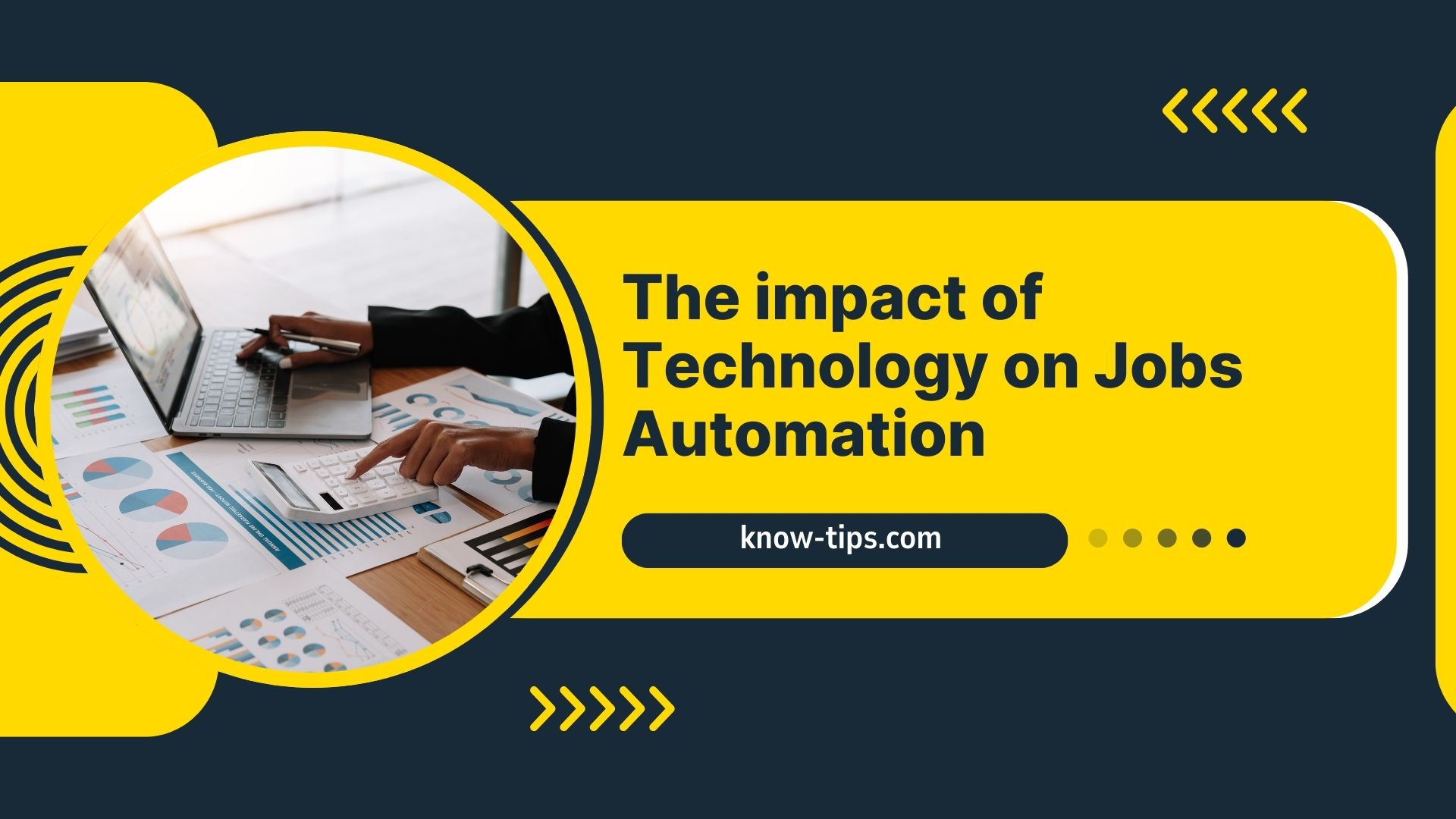The impact of technology on jobs automation (Updated 2024)

⇒ Introduction:
What is Automation?

Technology is used to perform the task without intervention by the user. The range varies from simple mechanical changes to advanced artificial intelligence (AI) and machine learning applications. By 2024, automation is at the forefront of industries as speeding up operations to the many sectors can be executed with ease.
Automation Importance and Purpose
This is where the importance and the purpose of automation are leading to able to change and revolutionized our industries. Without it, the modern economy is simply not possible, driving speed in business scaling and innovation. But this itself starts to ask questions about job displacement and what the future of work will look like, for which it is an important topic to discuss.
⇒ Benefits of Automation:

- Because the machines work through 24 hours productivity is increased because the machines are able to work more. For instance, as per the latest industry reports production efficiency has, by said example, increased to 30 per cent in 2024 when factories use robots.
- The era of automation has instead engendered fear of declining wages and dependent on the skills of technology developers, AI managers, and data analysts. Today, there will be over 10 million jobs worldwide to work for the automation industry by 2024.
- The automation of Improved Working Conditions can reduce human vulnerability to dangerous, repetitive tasks. Today, there are also hazardous processes that automated machines do, leaving the workers in industries such as mining in safer conditions.
⇒ Challenges of Automation:

- A number of low job tasks will be displaced by job displacement automation. According to a 2024 report, jobs across the globe could be automated to the tune of up to 25 percent by 2030, with manufacturing and retail bracing for the worst.
- Skill Gap: This is an area of growing gap between what workers actually know how to do and what is required for work in automated industries. However, ramping up reskilling programs to meet this challenge will only accelerate in the next four years; governments and private institutions are already getting involved, but at a lagging pace.
- The evidence shows that automation can widen the gap between low- and high-income workers. By 2024, the highly skilled jobs within tech-related fields are increasingly paid better, and the traditional, lower skilled jobs have stagnant or declining earnings.
⇒ Solutions to Automation Challenges:

- Automation is the topic of governments around the world that are walking the path to push back on the bad side that results from automation. For example, Germany or South Korea have delegated tax subsidies to companies that invest in worker retraining programs from 2024.
- Hybrid work: Businesses are deploying hybrid work models exploiting humans and machines to harness better performance. A growing number of companies in 2024 are investing in ‘collaborative robots’ that operate alongside humans rather than in lieu.
- Future proof your career with upskilling and reskilling areas like data analysis, machine learning, and AI. This year, we’ve seen many new automation focused courses launched by many online platforms like Coursera and Udemy.
⇒ Future of Work with Automation:
- Sectors like renewable energy, autonomous transport, and artificial intelligence based healthcare are being powered by the growing footprint of what we call Emerging Industries Automation. According to the World Economic Forum’s report on 2024, the next decade is likely to be observed by green technology and those newer forms of AI driven industries.
- Automation influences the gig economy as it changes. On Uber and TaskRabbit, increasingly, the gig economy is attaining efficiencies through the use of AI for job assignments. Automation in gig work has opened up new opportunities, especially in the area of tech based services, by 2024.
- By the year 2024, the key skills that will help your future workforce be successful are data literacy, digital collaboration and critical thinking. The latest McKinsey report shows that the demand for workers with AI and machine learning expertise will grow by 40 percent in the next five years.
⇒ Case Studies and Statistics:
-
Industry Examples

Amazon:
In 2024, Amazon will have more than 500,000 robots plying the automation wave in their fulfillment centers around the globe.
Tesla:
Like Space X, Tesla’s Gigafactories are highly automated facilities, which have allowed the company to easily reach operational scale.
-
Relevant Data

The global industrial robot market has grown to $50 billion in 2024 with a compound annual growth rate (CAGR) of 13 percent.
More than 70 percent of Fortune 500 companies are now using AI automation tools to streamline operations.
⇒ Global Perspectives and Expert Insights
-
Professional Quotes

Andrew Ng, AI Expert: “The work that automation will not take away from us entirely, but instead it will transform the nature of work, directing us toward more creative, and solving problems roles.”
McKinsey Global Institute, 2024 Report: “In the next five years, we’re anticipating a dramatic move toward automation and industries are going to require a robust strategy to get the right balance between technology and humans.”
-
Regional Automation Impacts

Asia:
By 2024, 30% of installed global robotic units will still take place in Japan and South Korea, where the main innovation has primarily been driven.
Europe:
As of 2024, nearly 40 percent of the manufacturing processes in the automotive industry in Germany are fully automated.
⇒ Conclusion:
Automation is changing the modern workforce — an opportunity, but it also brings challenges. Brought to you immense productivity gains and new job opportunities, it also brings with it job displacement and greater inequality. But to really reap the benefits of automation, governments, businesses and people need to work together. Up skilling and strategic planning would make this shift easier, as our future is bound to become more automated.
⇒ Frequently Asked Questions (FAQs):
-
What is automation?
Ans) Automation refers to the use of technology, such as AI and robots, to perform tasks without human intervention. It ranges from simple mechanical processes to complex AI-driven tasks.
-
How does automation affect jobs?
Ans) Automation can both displace and create jobs. While some roles may become obsolete, new jobs in tech and AI-related fields are emerging.
-
What are the benefits of automation?
Ans) Benefits include increased efficiency, reduced costs, improved safety, and the creation of new industries.
-
What industries are most impacted by automation?
Ans) Manufacturing, retail, logistics, and healthcare are some of the industries seeing the greatest impact from automation in 2024.
-
How can individuals prepare for automation?
Ans) Individuals can prepare by upskilling in fields like AI, machine learning, and data science, which are essential for future work environments.
-
Is automation good or bad for the economy?
Ans) Automation is generally beneficial for the economy as it boosts productivity, but it can also exacerbate inequality if not managed properly.
-
How are governments responding to automation?
Ans) Governments are introducing policies to support reskilling programs, and some are considering taxes on automation to manage its economic impact.
-
What is the future of automation?
Ans) By 2030, it’s predicted that automation will be fully integrated across most industries, leading to more intelligent, AI-driven operations.
-
How does automation impact developing countries?
Ans) In developing countries, automation could widen the economic gap, but it also offers opportunities for leapfrogging into advanced industries if managed correctly.
-
What are the risks associated with automation?
Ans) Risks include job displacement, data privacy concerns, and increased inequality. Proper regulation and strategic planning are essential to mitigate these risks.
Note:
If you have any questions, then comment on post we will respond as soon as possible.
thank you all to visit our site to get new tips and increase your knowledge. To get new blogs, visit our site daily.
share this to your friends: www.know-tips.com



